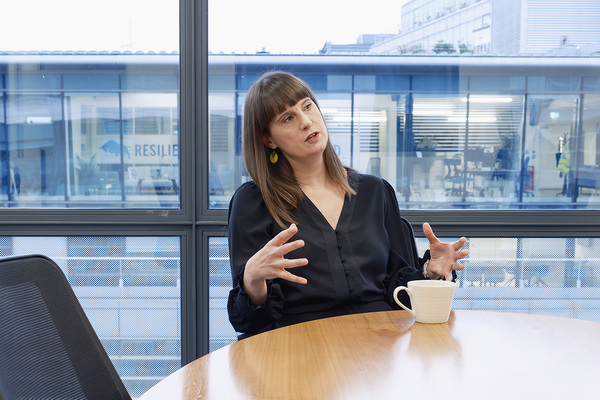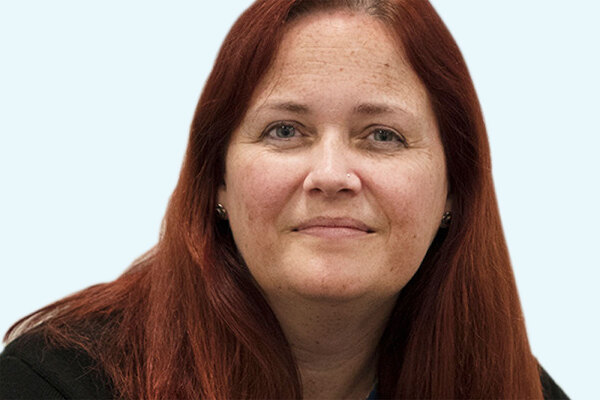How have customer-facing services transformed to support residents during the pandemic?
The pandemic has led to an increase in tenants needing support, particularly with rent. In many cases, this has driven organisations to speed up their digital transformation, boosting efficiency and giving staff more time to help residents. An Inside Housing roundtable, in association with Pay360 by Capita, explored this. Illustration by Neil Webb
In association with:

The pandemic hasn’t been the only force to reshape the housing sector in recent years. Digital technology is transforming workplaces and practices across industries, and housing is no exception.
The social and economic fall-out from COVID-19 has had a big impact on society’s most vulnerable. Its health and economic risks are higher for older people, low-income households and for Black, Asian and ethnic minority communities. It has exacerbated mental health problems and existing inequalities; it has pushed more families into poverty and towards a reliance on benefits.
For social landlords, this has meant a rise in rent arrears as well as in the numbers of tenants who need support – whether that is with their finances, physical and mental health, or even simply to put food on the table.
And, of course, the same measures that caused people to lose their jobs, or to have to isolate, have made it harder for landlords to maintain their levels of service, too.
The impact on the housing sector was, therefore, predictable.
Data collected by Housemark revealed a 30% increase in outstanding rent arrears between March 2020 and January 2021. That increase equates to £300m – almost one-third of the sector’s current (and record) total of £1bn in arrears, as many renters faced financial hardship brought on by the pandemic and the measures deployed to contain it.
How have digitisation and the COVID-19 pandemic interacted – and to what extent has technological transformation enabled social landlords to better support tenants whose lives have been upended by
the virus?
Inside Housing, in association with integrated payment solution Pay360 by Capita, brought together a group of senior housing professionals for a roundtable discussion, chaired by editor Martin Hilditch, to try to answer some of these questions.
Boosting capacity
At its best, the wider digital revolution promises to make life easier for businesses through automation, while creating a better customer experience at the same time.
The alternative view, however, is that the increases in efficiency and productivity that automation offers can come at the expense of the personal relationship between customer and service provider. But for the social landlords represented around the table, that hasn’t been the point at all.
Martin Hartley, director of business change at 35,000-home provider Thirteen Group, says that his organisation has put a lot of work into automating the way it manages arrears – but that this hasn’t primarily been about saving money.
“It means that, based on the data, we know who we don’t need to chase [for arrears], perhaps because they typically pay at a certain time of the month; who needs a gentle nudge; and who needs more one-to-one support,” he explains.
“That’s been a real success; rent arrears automation has generated [the recovery of] about £400,000 more arrears than in previous years… The driver is to free up people in those teams so they can focus on the more complex cases.”
Automated services don’t suit every tenant, and several participants underline the care that must be taken when targeting them. But the pandemic has provided a context in which new approaches can be tried out.
Kerry Starling, head of social and economic investment at 50,000-home landlord Hyde Group, says the main focus of Hyde’s social investment team is to deliver one-to-one advocacy and support services to residents when they fall into difficulties.
“COVID-19 gave us an opportunity to try new things out, and for the organisation to look more broadly at what the organisation could be doing with these services,” she says.
One example is Hyde’s UC Helper, an online tool that guides new Universal Credit applicants through the process (and which Hyde has made freely available to other organisations).
“We want to digitise,” Ms Starling adds, “but we have to recognise that it’s a challenge for some customers and we need to take that on board.”
Building relationships
In fact, far from damaging providers’ relationships with residents – their customers – some report that this change has had the opposite effect.
“A lot of times, the collections team is seen as the bad guys – we’re just here to collect the rent,” says Marcia Gay, group collections and financial inclusion manager at 67,000-home Peabody.
Part of Peabody’s technological evolution has involved deploying business intelligence software to more closely link its frontline teams and to share resident data between them.
“So if there’s a tenant that we’re having trouble getting hold of, they might be engaging with another team at Peabody – the employment or family support team, for example,” Ms Gay says.
“COVID-19 has turned people’s worlds upside down and a lot of people have gone under the radar… A lot of them are frightened to have these conversations.”
Having all the organisation’s resident data in one place and making it accessible means those conversations can now be initiated across Peabody’s frontline services.
For Tim Thwaites, head of income at 45,000-home Optivo, the pandemic has offered a chance for his team to build trust with tenants – despite the damage it has done to many of its residents’ financial situations.
“What really sticks out for me is the change in our relationship with our residents over the past 18 months,” he says.
“I think there is a lot more trust in us as an organisation, and certainly in my income team. Residents do see us as supportive much more than they used to.”
Out of office
The pandemic and the digital revolution crossed over in another major way when a significant chunk of the country’s workforce was compelled to work from home.
Some housing organisations had already dipped their toes in the water here, but the pandemic has accelerated a broader, faster transformation of working practices.
Today it seems hybrid working, where employees split their working time between the office and their home, is here to stay. Nearly eight in 10 (79%) housing sector workers said they were satisfied with working from home, in a survey published by Trent & Dove in September 2020, while last year, a study of 72 housing associations by HR specialist EMA Consultancy, found that 99% are planning to move to a permanent hybrid model.
“Hybrid working is the way forward for the vast majority,” says Sajjad Hussain, director of social housing at Pay360 by Capita. “I have spoken to quite a few large organisations who drew up their strategies two years ago. Suddenly the pandemic hit and they are reviewing those strategies again. It’s all about meeting the current challenge.”
Suzanne Mazzone, executive director of housing services at 6,000-home Welsh landlord ClwydAlyn, says her organisation has been on a similar journey. “We were in the process anyway of doing similar things around agile working and releasing office space, but of course the pace of that turned around much quicker as soon as the pandemic hit,” she says.
“It has helped us to look at things that maybe we thought would work, but when you are forced to use them quite quickly, they perhaps don’t work as well as you’d want them to. We are really still in the process of evolving that and putting that into place.”
Again, this shift to homeworking has helped income collection teams to build relationships with residents, says Sarah Saward, income manager at Weaver Vale Housing Trust.
“It has given our income team the space to have really good-quality conversations,” she says, adding that the distractions we’ve all become used to over video calls – interruptions by toddlers or pets, for example – can also help. “It makes [the experience] a bit more human, rather than just: ‘Why haven’t you paid your rent?”
Self-service
Lockdowns and homeworking narrowed the options available to both staff and residents. The reliance on digital channels for making payments increased for both groups, for example.
It was a big change, argues Lee Forrest, Money Matters manager at 30,000-home landlord Karbon Homes – but not necessarily a negative one.
“In the past, home visits and face-to-face meetings were probably the default,” he says. “But we learned very quickly that people were more than wiling to have that work carried out over the phone… It shows tenants that they are able to carry out parts of that casework themselves rather than [us] taking a paternalistic approach. It’s working in partnership with tenants to increase their resilience when things start to go wrong again – as they may well do.”
While the sector might be undergoing a digital transformation, that shift has been well under way in the consumer space for years, especially over the past 18 months – and many residents may have been more ready for the switch than their landlords.
“People’s expectations are different now,” says Rachel McFarlane, director of housing at 9,000-home provider Settle. “You might spend six months working on this amazing new part of your portal, and your customers are like: ‘Great, I expected you to do that anyway. What’s next? If the HSBC app can do this [for example], we expect you to be able to do it, too.’”
This is a broad topic, and the conversation around the table today has been accordingly wide-ranging.
Martin Hilditch, Inside Housing’s editor, sums up: “It feels as though everyone has reached a moment of reflection and is now moving on – so it will be fascinating to see how that develops over the course of the next year.”
Participants
Martin Hilditch (chair)
Editor, Inside Housing
Lee Forrest
Money Matters manager, Karbon Homes
Marcia Gay
Group collections and financial inclusion manager, Peabody
Martin Hartley
Director of business change, Thirteen Group
Sajjad Hussain
Director of social housing, Pay360 by Capita
Suzanne Mazzone
Executive director of housing services, Clwyd Alyn
Rachel McFarlane
Director of housing, Settle
Sarah Saward
Head of income, Weaver Vale Housing Trust
Kerry Starling
Head of social and economic investment, Hyde
Tim Thwaites
Head of income, Optivo
Sign up for our daily newsletter
Already have an account? Click here to manage your newsletters
















